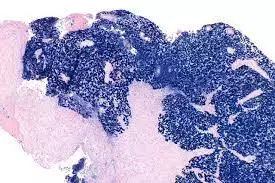- Home
- Medical news & Guidelines
- Anesthesiology
- Cardiology and CTVS
- Critical Care
- Dentistry
- Dermatology
- Diabetes and Endocrinology
- ENT
- Gastroenterology
- Medicine
- Nephrology
- Neurology
- Obstretics-Gynaecology
- Oncology
- Ophthalmology
- Orthopaedics
- Pediatrics-Neonatology
- Psychiatry
- Pulmonology
- Radiology
- Surgery
- Urology
- Laboratory Medicine
- Diet
- Nursing
- Paramedical
- Physiotherapy
- Health news
- Fact Check
- Bone Health Fact Check
- Brain Health Fact Check
- Cancer Related Fact Check
- Child Care Fact Check
- Dental and oral health fact check
- Diabetes and metabolic health fact check
- Diet and Nutrition Fact Check
- Eye and ENT Care Fact Check
- Fitness fact check
- Gut health fact check
- Heart health fact check
- Kidney health fact check
- Medical education fact check
- Men's health fact check
- Respiratory fact check
- Skin and hair care fact check
- Vaccine and Immunization fact check
- Women's health fact check
- AYUSH
- State News
- Andaman and Nicobar Islands
- Andhra Pradesh
- Arunachal Pradesh
- Assam
- Bihar
- Chandigarh
- Chattisgarh
- Dadra and Nagar Haveli
- Daman and Diu
- Delhi
- Goa
- Gujarat
- Haryana
- Himachal Pradesh
- Jammu & Kashmir
- Jharkhand
- Karnataka
- Kerala
- Ladakh
- Lakshadweep
- Madhya Pradesh
- Maharashtra
- Manipur
- Meghalaya
- Mizoram
- Nagaland
- Odisha
- Puducherry
- Punjab
- Rajasthan
- Sikkim
- Tamil Nadu
- Telangana
- Tripura
- Uttar Pradesh
- Uttrakhand
- West Bengal
- Medical Education
- Industry
Intensity-modulated radiation therapy alone effective in low-risk nasopharyngeal carcinoma: JAMA

Among patients with low-risk nasopharyngeal carcinoma, intensity-modulated radiation therapy (IMRT) alone compared with concurrent chemoradiotherapy was not inferior for 3-year failure-free survival suggests a recent study published in the JAMA.
Concurrent chemoradiotherapy has been the standard treatment for stage II nasopharyngeal carcinoma (NPC) based on data using 2-dimensional conventional radiotherapy. There is limited evidence for the role of chemotherapy with use of intensity-modulated radiation therapy (IMRT).
A study was conducted to assess whether concurrent chemotherapy can be safely omitted for patients with low-risk stage II/T3N0 NPC treated with IMRT.
This multicenter, open-label, randomized, phase 3, noninferiority clinical trial was conducted at 5 Chinese hospitals, including 341 adult patients with low-risk NPC, defined as stage II/T3N0M0 without adverse features (all nodes <3 cm, no level IV/Vb nodes; no extranodal extension; Epstein-Barr virus DNA <4000 copies/mL), with enrollment between November 2015 and August 2020. The final date of follow-up was March 15, 2022.
Patients were randomly assigned to receive IMRT alone (n = 172) or concurrent chemoradiotherapy. The primary end point was 3-year failure-free survival (time from randomization to any disease relapse or death), with a noninferiority margin of 10%. Secondary end points comprised overall survival, locoregional relapse-free survival, distant metastasis-free survival, adverse events, and health-related quality of life (QOL) measured by the European Organisation for Research and Treatment of Cancer Quality of Life Questionnaire (QLQ-C30; range, 0-100 points; minimum clinically important difference ≥10 for physical function, symptom control, or health-related QOL; higher score indicates better functioning and global health status or worse symptoms).
Results:
- Among 341 randomized patients, 334 completed the trial.
- Median follow-up was 46 months.
- Three-year failure-free survival was 90.5% for the IMRT-alone group vs 91.9% for the concurrent chemoradiotherapy group
- No significant differences were observed between groups in overall survival, locoregional relapse, or distant metastasis.
- The IMRT-alone group experienced a significantly lower incidence of grade 3 to 4 adverse events including hematologic toxicities (leukopenia, neutropenia) and nonhematologic toxicities (nausea, vomiting, anorexia, weight loss, mucositis).
- The IMRT-alone group had significantly better QOL scores during radiotherapy including the domains of global health status, social functioning, fatigue, nausea and vomiting, pain, insomnia, appetite loss, and constipation.
Thus, among patients with low-risk NPC, treatment with IMRT alone resulted in 3-year failure-free survival that was not inferior to concurrent chemoradiotherapy.
Reference:
Tang L, Guo R, Zhang N, et al. Effect of Radiotherapy Alone vs Radiotherapy With Concurrent Chemoradiotherapy on Survival Without Disease Relapse in Patients With Low-risk Nasopharyngeal Carcinoma: A Randomized Clinical Trial. JAMA. 2022;328(8):728–736. doi:10.1001/jama.2022.13997
Keywords:
Effect, Radiotherapy, Alone, Radiotherapy, Concurrent, Chemoradiotherapy, Survival, Without, Disease, Relapse, Patients, Low-risk, Nasopharyngeal, Carcinoma, Ling-Long Tang, Rui Guo, Ning Zhang, Bin Deng, Lei Chen, Zhi-Bin Cheng, Jing Huang, Wei-Han Hu, JAMA
Dr. Shravani Dali has completed her BDS from Pravara institute of medical sciences, loni. Following which she extensively worked in the healthcare sector for 2+ years. She has been actively involved in writing blogs in field of health and wellness. Currently she is pursuing her Masters of public health-health administration from Tata institute of social sciences. She can be contacted at editorial@medicaldialogues.in.
Dr Kamal Kant Kohli-MBBS, DTCD- a chest specialist with more than 30 years of practice and a flair for writing clinical articles, Dr Kamal Kant Kohli joined Medical Dialogues as a Chief Editor of Medical News. Besides writing articles, as an editor, he proofreads and verifies all the medical content published on Medical Dialogues including those coming from journals, studies,medical conferences,guidelines etc. Email: drkohli@medicaldialogues.in. Contact no. 011-43720751


